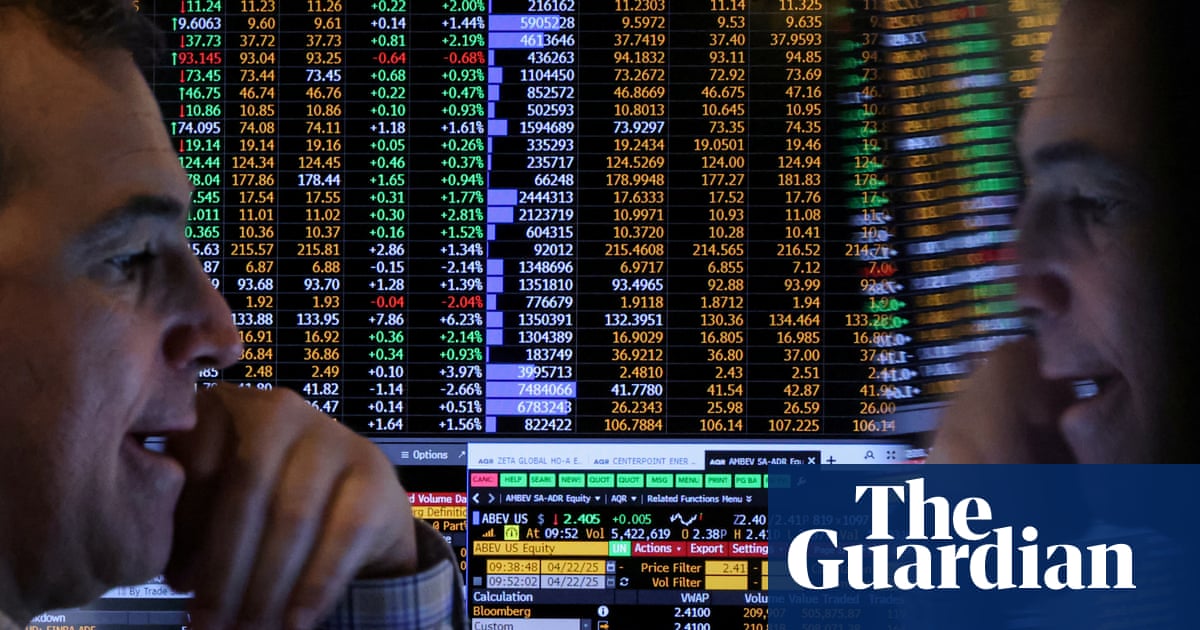A trade war with China and suggestions Donald Trump will sack the head of the Federal Reserve have weighed heavily on the US stock market. It was already reeling after the president’s announcement of universal tariffs on the whole world, and, despite recovering some of its losses, remains down on the start of the year.
In the UK, you may be wondering whether any of it matters to you. The short answer is that it could – without realising it, you may have exposure to the ups and downs of US shares.
Dr Sayantan Ghosh Dastidar, a senior lecturer in economics at the University of Derby, says: “In 2023, UK investment managers allocated only 20% of their portfolios to UK equities – a record low. By comparison, 35% was directed toward US assets.
“There has been a sharp decline in domestic allocation over the past two decades, falling from about 50%, while the allocation to US assets has nearly doubled over the past 10 years.”
Those investment managers are running funds for individuals and organisations, including money saved into UK pensions.
Dan Coatsworth, an analyst at the investment platform AJ Bell, says the popularity of investment in the US, in part driven by large technology companies, means most people’s pensions will have some stake in American firms.
How could I be affected?
While you may not directly own stocks in US companies, you may have a pension or pensions with investment there.
This can be the case for both defined benefit schemes (also known as final salary schemes), which guarantee an income for life, and defined contribution schemes, where your eventual payment is based on how much you invest and how those investments perform.
For example, almost a third of the pension firm Aegon’s default fund is made up of US equities. That is more than the proportion that is made up UK shares and government bonds combined. Meanwhile, Royal London’s RLP governed portfolio default fund is 22% US equities – more than UK or European shares. These companies run defined contribution schemes for thousands of employers.
The largest defined benefit scheme in the UK, the Universities Superannuation Scheme (USS), also holds US equities.
Pension providers should be able to give you fund factsheets to show where your pension is invested, says Helen Morrissey at the investment platform Hargreaves Lansdown, if you want to know the detail.
Should I be worried?
Coatsworth says the US markets are still up on where they were a decade ago. “The S&P 500 index [one of the benchmark indexes] is down 10% year to date but still up 89% over five years and 150% ahead over 10 years,” he says.
“A long-term investor might still be sitting on big gains if they’ve had US exposure for a while and this year’s dip is no reason to cause alarm. Financial markets regularly move up and down and history suggests that they eventually recover and move higher.”
Some defined contribution schemes will shift you away from equities to cash and bonds the closer you get to retirement, so although the default scheme may invest in the US, you may not have much money exposed to the market.
However, Zoe Alexander, of the Pensions and Lifetime Savings Association (PLSA), an industry body, says the recent falls may mean people who are about to retire should delay. “[It] may mean now is not the best time to begin drawing your pension or purchase an annuity. It may be a good idea to delay or reduce the amount you take out if you are able to.”
If you are a few years off retiring, advisers say there is time for the markets to recover and regain any losses.
“Though the turbulence is worrying the best thing to do is not to make any kneejerk reactions such as stopping contributions or changing investment strategies,” Morrissey says. “These have the potential of crystallising losses, making it harder for your fund to recover when markets settle.”
Anyone with a defined benefit scheme has less cause to worry as it is up to their employer to ensure there is enough money available to pay their pension income. Some of the funds have large cash “buffers” or surpluses in the case of problems. USS has a £9.7bn surplus, while Barclays Bank UK Retirement Fund, a defined benefit scheme, has a surplus of £1.8bn.
If you are worried about what to do, free guidance is available from the Pensions Advisory Service. Pension Wise, a government scheme set up to provide specialist guidance, gives free advice to the over-50s.
Is there anything positive from the market turmoil?
A drop in the value of the dollar means that people who are planning to go to the US for holidays may see their money stretch a little further.
But if you are going to Europe, the exchange rate may be against you.
“Movements so far might persuade some people planning a [US] trip to get at least some of their holiday spending money a bit earlier,” says Sarah Coles of Hargreaves Lansdown. “For those travelling to Europe, the fact that money has flooded to the euro as a relative safe haven has pushed it up against the pound, which means you’ll get less for your money if you’re travelling to the eurozone. It’s going to be even more important to shop around for the best possible exchange rate when you travel.”
